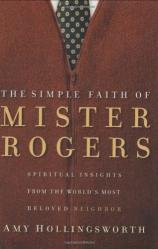The Simple Faith of Mister Rogers: Spiritual Insights from the World's Most Beloved Neighbor
Review
The Simple Faith of Mister Rogers: Spiritual Insights from the World's Most Beloved Neighbor
When Amy Hollingsworth scored a rare interview with Fred Rogers in 1994, it began a relationship of letters and phone calls between the two that spanned eight years, lasting until three weeks before his death in 2003. It culminates in this compelling inspirational book, THE SIMPLE FAITH OF MISTER ROGERS: Spiritual Insights from the World's Most Beloved Neighbor.
Using the analogy of "toast sticks," a treat Rogers cited as a milestone in his childhood, Hollingsworth gathers up the "spiritual toast sticks" Rogers bequeathed to her --- toast sticks of the heart (inner disciplines), for the eyes (seeing others), and for the hands (using practical things we've learned). She adeptly weaves snippets of her own life throughout, exemplifying the influence Rogers had on her life.
Hollingsworth paints a portrait of a disciplined, contemplative man of deep faith ordained by the United Presbyterian Church as an evangelist with a unique charge to serve children and families through television. And rather than conform to what passed for quality children's programming, he determined to chart his own course. "I'm so convinced that the space between the television set and the viewer is holy ground," he told Hollingsworth.
There was no frantic Sesame Street action in "Mister Rogers' Neighborhood." Each of the 900 episodes opened with a traffic light flashing in yellow. Slow down, was the message. Take time. "And so, for me, being quiet and slow is being myself, and that is my gift," Rogers told Hollingsworth. "Sometimes slow is better: in understanding, in learning to be patient, in 'going deeper' spiritually," observes Hollingsworth, a self-confessed Type A, hyperactive person.
Rogers also used the unlikely medium of television to teach about silence. Hollingsworth relates the story of cellist Yo-Yo Ma playing a composition on the show and Rogers telling children: "Let's take some quiet time to remember, to sit and think about what we've heard." And he did. Silence, Hollingsworth says, wasn't dead air to Rogers --- it was thanking the God who inspires and informs all that is nourishing and good. "Fred may have considered silence his most important legacy."
Right next to feelings, that is. Rogers referred to himself as an "emotional archaeologist," Hollingsworth writes, wanting to get to the root of what motivates people. As a child, he was overweight and teased by bullies. He wanted someone to tell him it was okay to feel bad. As an adult, he encouraged children to open up about their feelings through setting an example of vulnerability on the show himself. His plea for public television as a venue for teaching about feelings helped him sway the U.S. Senate Subcommittee on Communications to come through on a $20 million grant for the medium in 1969.
"It's one of the most important parts of the Neighborhood, knowing that feelings are all right. You know, that you don't have to hide them and that there are ways that you can say how you feel that aren't going to hurt you or anybody else. If there were a legacy that I would hope for the Neighborhood passing on, that's certainly one of them."
Rogers, Hollingsworth shows, carefully structured his life. He rose every morning at 5 a.m. for prayer. He swam at 7:30 a.m. (after singing "Jubilate Deo" out loud, a song taught to him by his mentor Henri Nouwen), worked, then went to bed at 9:30 p.m. He ate no meat and drank no alcohol. "It isn't difficult to see why a man with this level of discipline would be able to cultivate an interior life that would inspire awe in others," writes Hollingsworth.
His spirit was contagious. He once quieted five thousand rowdy Boston University graduates at commencement by inviting them to sing, "It's a Beautiful Day in the Neighborhood." He befriended inmates he taught in a maximum-security prison. "Love Boat" star Lauren Tewes credits his show with giving her the strength to kick her cocaine habit. He inspired song lyrics.
Hollingsworth emphasizes Rogers's humility. (Can you say "humble"? Sure you can.) "I don't think of myself as somebody who's famous. I'm just a neighbor who comes and visits children; (I) happen to be on television. But I've always been myself. I never took a course in acting. I just figured that the best gift you could offer anybody is your honest self, and that's what I've done for lots of years. And thanks for accepting me exactly as I am."
We do, Mister Rogers. We do.
Reviewed by Cindy Crosby on February 1, 2005
The Simple Faith of Mister Rogers: Spiritual Insights from the World's Most Beloved Neighbor
- Publication Date: February 1, 2005
- Genres: Christian, Inspirational
- Hardcover: 224 pages
- Publisher: Integrity Publishing
- ISBN-10: 1591452295
- ISBN-13: 9781591452294





